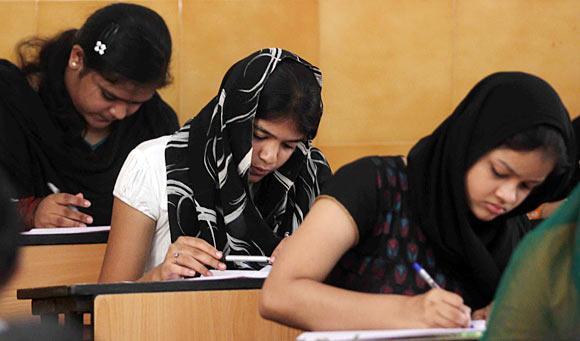 | « Back to article | Print this article |
Are you ready to bell the CAT?
With hundreds of thousands of students appearing for the Common Admission Test each year to fill up the few thousand seats, most applicants feel that getting the near perfect percentile may not be a cakewalk.
Here, Shobhit Bhatnagar, founder of Gradestack.com, a mobile learning platform and an alumnus of IIM-Calcutta tells you why it's not an impossible feat.
The Indian Institutes of Management have announced major changes for the Common Admission Test in 2014, including changes in the number of questions, the duration of the exam, etc.
Here is an analysis of how these changes affect you and what you should be doing over the next three and a half months to make sure you are well prepared for all the changes:
It’s a longer exam, with a lot more questions
The CAT exam has become lengthier by 30 minutes.
This is a substantial amount of time, as most of us are not used to taking tests for three hours at a stretch.
Also, the number of questions has gone up substantially (by 67 per cent).
Solving 100 questions at a stretch takes much more exam endurance and for that, proper practice is critical.
While the exam is lengthier, there is less time in CAT 2014
The time available per question has gone down, from two minute 20 seconds to 1 minute 42 seconds.
This is a substantial reduction in time.
I don’t think the IIMs will bring down the level of questions, the challenge is now bigger than ever.
I had earlier heard stories of people completing the exam before time; I guess that won’t be the case any more!
What this really means is that speed is now very important.
Your strategy of attempting questions, understanding what is the right time to leave a question, etc., will now play a key role.
It is even more important to know your strengths and weaknesses and understand which questions are worth attempting.
The luxury of spending that extra time on the few tough questions is now gone.
The new Exam Interface
The CAT will have a new interface from this year.
It would be beneficial if you are accustomed to it.
You should at least take two to three mock tests in this format to make sure you are accustomed to this interface and not the previous one.
The test is being conducted by Tata Consultancy Services who also conduct the JEE Main, GATE and the IBPS exam.
The interface for all these exams is the same, so it is highly likely it will be the same for the CAT exam.
After all the controversies with Prometric, this looks like a positive step.
TCS has a much wider experience in conducting exams within India.
The changes in the exam pattern are aimed at making the exam more competitive so that the IIMs are better able to judge the student's abilities through his/her performance.
Switching between sections
The exam gives you an option to move between the two sections at will.
This is good news, as now you have the flexibility of moving between sections and taking a little bit of extra time on sections that puzzle you.
Using this efficiently can also get you time to review your answers at the very end.
On the flip side, this also makes time management more critical.
It becomes your responsibility to make sure that you give ample time to both the sections and do not wind up spending all the time on only one section.
There indeed have been some large-scale changes in the CAT, which has raised the bar further.
I think that the new format will provide a better assessment of students' capabilities, as it increases flexibility but forces the student to make better use of the available time.
